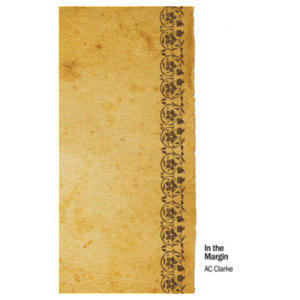 In the Margin
In the Margin
Published by Cinnamon Press ISBN 978-1-909077-95-9
I have always liked AC Clarke’s poetry. It’s clever, detached, witty, observant and meticulously crafted. But in this collection, something seems to have happened. The subjects are familiar – the small grotesque creatures, obscure characters from history or and objects from museums are still here, wild children, marginal illustrations from manuscripts, the mystic Margery Kempe and the fortune teller Mother Shipton – and the wry sideways glances at the darkness behind conventional exteriors. There are the same incisive descriptions:
spinal bones
like necklaces of tiny
cotton reels
(Ode to Tinned Salmon)
Or
The Tyne’s a black strip flecked
With random lights
(Haddock and Chips)
but we are on more familiar territory, with poems to tinned salmon (whose severe description of the tehnicolour flesh sprinkled with vinegar and doused with salad cream) is softened by nostalgic affection and the memory of shared celebrations) train tickets, nights in pubs and bus journeys.
There’s a lightness in the metre, a bit more movement and heft in the way the lines dance or strut in the four poems about Margery Kempe, and gentler reflection in the observation of Velasquez’ Old Woman Cooking Eggs (which I think is my favourite of these poems, though perhaps not the most interesting). AC Clarke has always had a fine line in anger and irony, and a dry sense of humour, but there is both more passion and more ambiguity in these poems. I am endlessly fascinated by the relationship described in Haddock and Chips, by the transformation of the censorious woman in Enlightenment, and the merriment of Pandemonium.
The central section of the book is a sequence of poems about the progress of a love affair set against the backdrop of terrorist violence, and the first and last sections mirror each other, featuring poems about love, death, wildness, and education. Both finish with poems about poetry and its role in the life of both poet and audience – The Poem and At the Reading. Together they create a manifesto which seems appropriate to a poet hitting new heights.
Leave a Reply